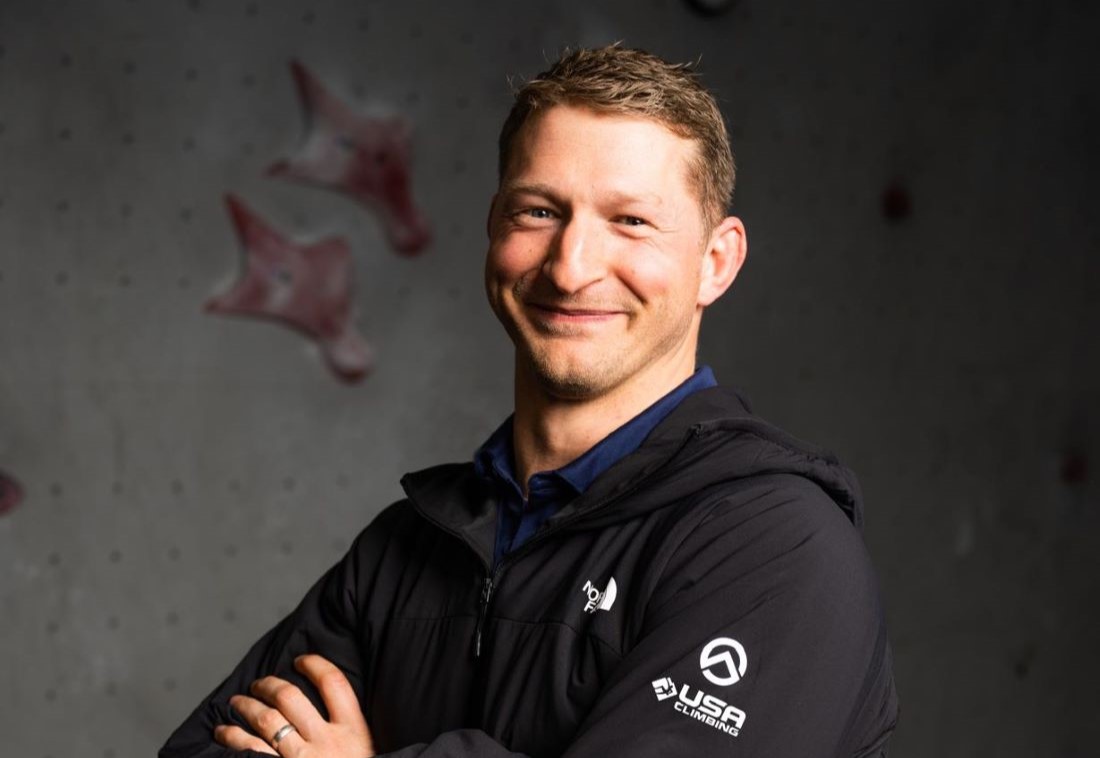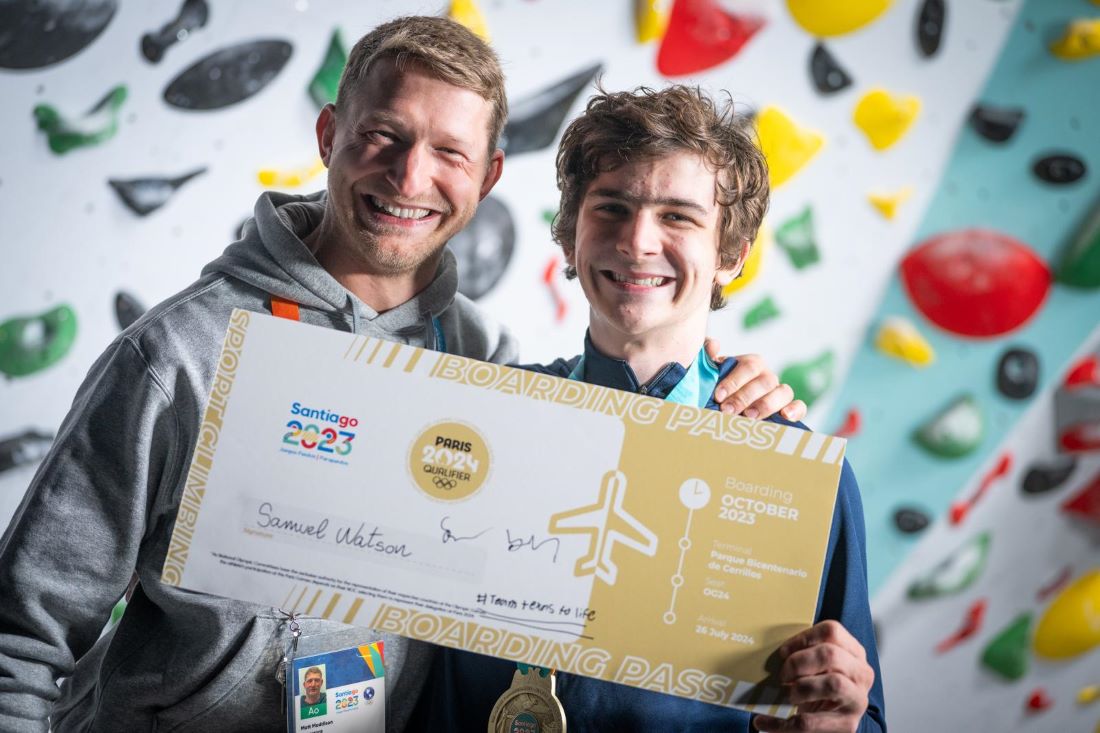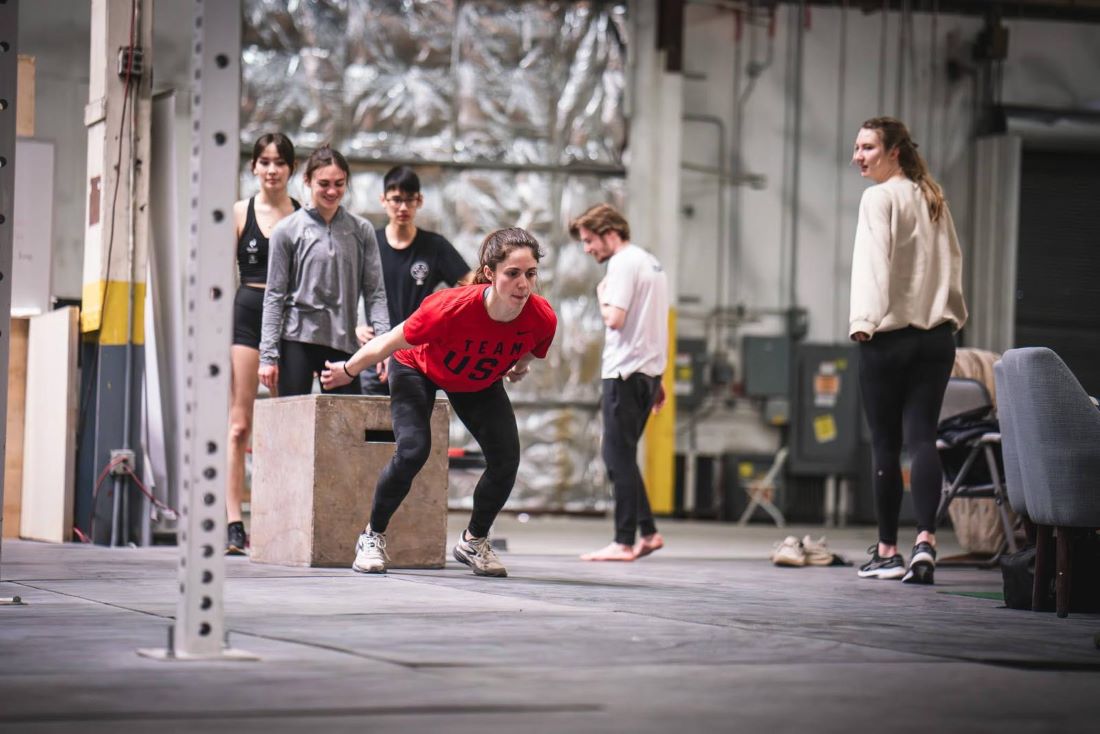This website uses cookies so that we can provide you with the best user experience possible. Cookie information is stored in your browser and performs functions such as recognising you when you return to our website and helping our team to understand which sections of the website you find most interesting and useful.
Interview: USA Climbing speed coach Matthew Maddison on Olympic opportunity and going for gold
By Tessa Crowley | 16 July 2024 | Culture, Sport
As the summer of sport continues, teams everywhere are readying themselves for the Olympics. Here, USA Climbing’s strength and conditioning coach, Matthew Maddison, talks training, resilience, and what it takes to go for gold
 Matthew Maddison is USA Climbing’s strength and conditioning coach. Previously a Major League American rugby coach in Utah, he made the switch when he saw the potential climbing held as a sport. With a passion for research and people, Matthew spends his days juggling schedules and training for the USAC speed team, organising travel and training plans, and talking to his athletes, many of who are scattered across the States.
Matthew Maddison is USA Climbing’s strength and conditioning coach. Previously a Major League American rugby coach in Utah, he made the switch when he saw the potential climbing held as a sport. With a passion for research and people, Matthew spends his days juggling schedules and training for the USAC speed team, organising travel and training plans, and talking to his athletes, many of who are scattered across the States.
Having picked up three gold medals in Chamonix at the IFSC Climbing World Cup this weekend, Matthew’s team of Olympics hopefuls are now setting their ambitions firmly on Paris. We sat down to hear how he’s preparing the American speed team, and himself, for their Olympic debut.
Speed climbing is a relatively new sport and one some readers may be unfamiliar with. Your background is pro rugby – can you tell us what the attraction is, and why you made the switch?
Climbing is rather fascinating to work in because they’ve not had a basis of strength and conditioning. There’s limited research out there. If you join more traditional sports, it’s been done, but within climbing it’s all new. It’s exciting for me as a coach.
Is there a big difference between speed and other forms of climbing then?
Yes, they are very different. It’s almost the comparison between being a sprinter versus a 10,000 meter runner. Climbing debuted at 2020’s Tokyo Games, so it’s the first Olympics for most of your athletes. How do you even begin to prepare?
Climbing debuted at 2020’s Tokyo Games, so it’s the first Olympics for most of your athletes. How do you even begin to prepare?
It’s about bringing in a personal note. I’ve asked my team to consider ‘what does the Olympics mean to you?’.
It’s your first Olympics as well, what does it mean to you?
I share this with my team, but I love the history – when it came to the Olympics, it didn’t matter what was going on in the world. Wars would be stopped! Today, it‘s [still] not just about the sport, it’s the knowledge that three billion other people are watching too. Celebrating the successes, the commiserations, and coming together with everyone on Earth. It’s the only time it ever happens in human history.
How do you believe this thinking impacts your athletes’ mindset?
They find their why and know what they’re going into. They have focus. They’re not just there to compete, they’re there for the life experience; to meet people; to be an ambassador. They’re such a wonderful group, if everyone were like these climbers you’d have a great world because they’re lovely people.
It’s clear, as their coach, your training considers their psyche as much as their physical prowess. What’s the impact on you?
Everyone that you work with leaves their mark on you, but these guys especially so. They’re incredibly individualistic and driven. You’d think everyone wants money, but that’s not how they look at life. They look at it as ‘What’s the climb, what’s the next challenge, what’s the next thing that I feel this intrinsic drive for…’. It makes them very much worth working with.
[As a Brit], I’ve also had to get to know American culture and language. Though they’ll use ‘press up’ instead of ‘push up’ because I say it all the time! Along with the physical and emotional side of training, is there anything else you factor in for your athletes?
Along with the physical and emotional side of training, is there anything else you factor in for your athletes?
It’s one of those sports where you have one, maybe two opportunities to show what you can do. It’ll be over in under seven seconds. The psychological component is tricky to say the least.
How do you train for that?
It’s about long-term planning. We throw in mock simulation days, but that doesn’t induce the same stress, so we have a couple of strategies. The team have keywords to ground themselves with, to focus on the process, rather than getting carried away with breaking a world record or a personal best. You don’t try to run a hundred percent every time.
Other strategies include your preparation the night before. Are you doing your visualisations? Are you doing any meditation? Are you sticking to your warm up? Simple things keep you on track and having a plan, to me, is everything. If you get flustered two hours before, you’re going to stay flustered.
A lot of our readers are enthusiastic home athletes. Do you have any more tips for them?
The first thing is, just put the work in. Nowadays, I just see people procrastinating or overanalysing their given sport. Don’t think about things too much, you just need to get on with it. Secondly, put a plan together and execute it. Finally, just enjoy it! If they are hard days, good. Be motivated by the hardest training you’ve ever done; be proud of having done it. Have something worth remembering when you’re older.  Your athletes competed at the Pan American Games for the first time last year and, more recently, the Climbing World Cup. The Olympics will offer a much bigger stage in terms of visibility. Is there a difference in terms of athletic prowess or competition?
Your athletes competed at the Pan American Games for the first time last year and, more recently, the Climbing World Cup. The Olympics will offer a much bigger stage in terms of visibility. Is there a difference in terms of athletic prowess or competition?
You have quotas from continents [so] the quality of the competition does change. But that’s the joy of the Olympics, isn’t it? Everyone gets to take part, everyone gets to support those people; you’ve got more people watching, more people invested, more people enjoying what’s coming. The Olympics is on such a big stage, we’ll go from having a few thousand viewers [for speed climbing], to hopefully ten, twenty, thirty million plus viewers.
Winning a World Cup is great. But winning the Olympics? For our athletes, it would change their life.
USAC also has a dedicated para-climbing team, yet currently there isn’t the opportunity to compete on this global stage.
No, and we would love for it to be included. Watching those athletes climb is astonishing. If and when it’s included in the Paralympics, people will see it’s another opportunity and another route you can pursue within sport. It would be wonderful.
And for you and the team competing, do you feel prepared for Paris?
Yes, I’m expecting great things from these guys. We’re putting in the work – working on our processes, sticking to the plan, and working on psychology. In the end, that’s what it comes down to: do the basics well, and you’ll win.







